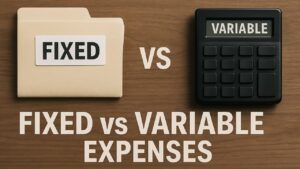Retirement may seem like a distant dream, but its success depends on the foundation you lay today. Financial security during retirement is essential. Planning for retirement allows you to enjoy your retirement years without financial worries. This article will help you create a realistic retirement budget, understand financial planning, and prepare financially for the future. This article answers your questions and provides concrete strategies to help you start planning for retirement today, from setting goals to avoiding pitfalls.
Why a Retirement Budget is Important:
Retirement planning is about creating a lifelong financial blueprint, not just about saving. Many people underestimate the need to budget in advance, which can lead to financial problems later in life. Budgeting for retirement allows you to live comfortably without depleting your resources. It can help you manage your expenses, save for unexpected medical expenses, and live comfortably. Saving in advance helps build your savings. Without a retirement budget, you could run out of money, causing anxiety and reducing your quality of life.
Understand Your Finances:
Before you plan for retirement, you need to assess your financial situation. This includes understanding your income, expenses, assets, debts, and savings. Start by recording all of your monthly expenses to minimize them and save for retirement. Evaluate your 401(k) and IRA accounts based on your goals. Consider debts like mortgages and student loans that could impact your savings. Having a clear picture of your finances will allow you to make informed decisions and plan for retirement.
Set Realistic Retirement Goals:
Your retirement goals will determine your spending. How do you want to spend your retirement? Do you want to travel, pursue hobbies, or live a simple life? Their answers will reveal your financial needs. To live a better retirement life, experts recommend saving 70-80% of your current salary. Calculating future housing, healthcare, travel, and daily expenses will help you set realistic savings goals. Clear goals can keep you motivated and focused on building your dream retirement.
Create a Retirement Budget:
A retirement budget can help you manage your finances. Divide your budget into fixed expenses (housing, insurance, and utilities) and discretionary expenses (eating out, travel). Healthcare is a big expense during retirement, so estimate your average costs. Inflation factor, as prices for goods and services may be higher. Once you have your budget, compare it to your expected retirement income from Social Security, pensions, savings, or part-time work. This comparison will help you identify gaps and come up with solutions.
Retirement Investment Strategies:
Saving alone may not guarantee retirement. Growing your retirement fund requires smart investing. Diversify your portfolio across stocks, bonds, real estate, and mutual funds, depending on your risk tolerance and retirement plan. Young investors can afford riskier strategies, while those closer to retirement may prefer safer ones. Make regular deposits into your 401(k) or IRA account and take advantage of your company’s matching programs. Consider tax-advantaged Roth IRA or HSA accounts for higher growth. Financial health during retirement depends on investments that keep pace with inflation.
Budget Review and Adjustment:
Retirement budgets are not automatic. Regular reviews and adjustments are necessary to address medical needs, market fluctuations, and financial goals. Review your income and expenses annually. If you’re spending more than you planned or your money isn’t growing, a few changes can prevent long-term financial problems. Consult an expert if necessary. A financial planner can advise you on whether your asset allocation is appropriate or whether you need more savings options. A proactive approach to your finances will help you stay on track and balance your savings and expenses.
Avoid These Budgeting Mistakes:
Even the best-laid plans can fail if they aren’t specific. It’s easy to deplete your savings if you underestimate medical expenses. Another mistake is not accounting for inflation, which can leave you with too little money for your lifestyle. State pensions may not cover your needs, so don’t overdo it. Some investors get overexcited and don’t realize the risks, leading to huge losses. Finally, delaying your retirement planning can put a strain on your budget and limit your investment potential. Learn from these mistakes to avoid costly mistakes and ensure a comfortable retirement.
The Role of Financial Planning:
Financial preparation is essential to budgeting for retirement. A professional financial advisor can help you improve your investments and plan for sustainable withdrawals. They can help you maximize your tax-efficient accounts through tax planning. An experienced planner can help you understand cash flow management and risk minimization. Financial planning can help you create realistic retirement plans and track your progress. This proactive, personal step can give you peace of mind and the skills to become financially independent.
Manage Your Retirement:
Creating a retirement budget can seem daunting, but starting now can reduce stress later. Understanding your financial situation, setting realistic goals, and creating a budget can help you enjoy your retirement. Smart investment techniques and flexible planning can help you grow financially and adapt to changes in your life. Seek professional help to optimize your financial decisions. Retirement is about planning, not just saving. Start planning now to enjoy a worry-free retirement.
FAQs:
1. When should I budget for retirement?
Start early to optimize savings and compound interest. It’s never too late to start—just adjust your goals to fit your timeline.
2. How much money do I need to retire comfortably?
Experts recommend saving 70–80% of your salary each year before retiring. However, your lifestyle, location, and healthcare costs can affect what you need.
3. What are good retirement investments?
Options include a 401(k), IRA, mutual funds, bonds, and real estate. Your retirement plan should take into account your risk tolerance and retirement age.
4. How do you account for inflation during retirement?
When predicting future expenses, take annual inflation into account. Adjust your savings and investment goals to preserve the purchasing power of your money.
5. Should I hire a financial advisor to help me plan for retirement?
Although a financial advisor is not required, he or she can provide tailored advice, optimize savings techniques, and link assets to retirement goals.




